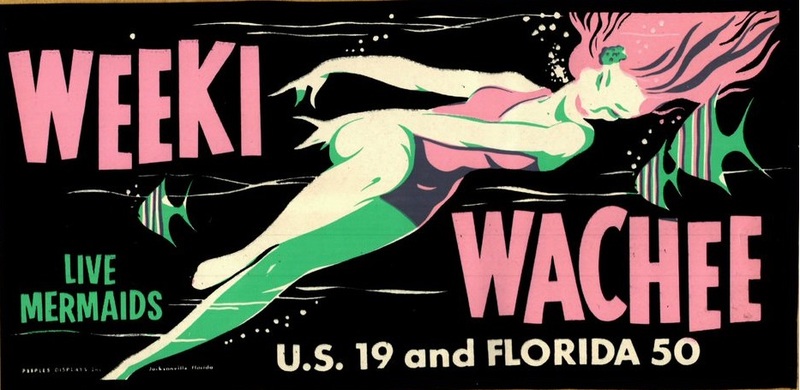Weeki Wachee Live Mermaids
Dublin Core
Title
Weeki Wachee Live Mermaids
Alternative Title
Weeki Wachee
Subject
Weeki Wachee Springs (Fla.)
Tourism--Florida
Springs--Florida
Parks--Florida
Description
A small poster for Weeki Wachee Springs. The background of the poster is black, featuring a cartoon mermaid and three fish. The text reads, "Weeki Wachee Live Mermaids. U.S. 19 and Florida 50."
Newton "Newt" Perry was born in Valdosta, Georgia in 1908, and moved with his family to Ocala, Florida in 1922. He was a member of the swimming and diving teams at the University of Florida. Perry earned the nickname "The Human Fish" for his performances of underwater stunts in advertising clips and film shorts, and acted as a swim double for actors in movies and TV shows, including Johnny Weissmuller as "Tarzan." Perry also advised filmmakers filming underwater scenes at Silver Springs, Wakulla Springs, and Weeki Wachee Springs, and developed a system for breathing underwater using an air compressor and hose, which was used in the 1948 film "Mr. Peabody and the Mermaid" and during Weeki Wachee Springs' mermaid shows.
Perry worked as a lifeguard, public school principal, coach, swimming and scuba diving instructor, and Ocala city pool manager. He opened Perry's Swim School in 1955, and taught more than 120,000 individuals to swim during his career. Perry was inducted into the Florida Sports Hall of Fame in 1981. Perry's daughter Delee Perry took over Perry's Swim School following her father's death in 1987, and it was still in operation as of 2020.
Along with a group of investors, Newton Perry opened Weeki Wachee Springs to the public in October of 1947, and used his experiences working at Silver Springs and Wakulla Springs to develop the original concepts for its underwater theater and mermaid shows. Perry sold his stake in Weeki Wachee Springs in 1950. After peaking in the 1950s and 1960s, attendance began to decline as theme parks and highways changed the dynamics of Florida's tourism. The State of Florida took over the attraction as a state park in 2008. Since then, the park has focused on appealing to a modern audience while preserving its history.
Newton "Newt" Perry was born in Valdosta, Georgia in 1908, and moved with his family to Ocala, Florida in 1922. He was a member of the swimming and diving teams at the University of Florida. Perry earned the nickname "The Human Fish" for his performances of underwater stunts in advertising clips and film shorts, and acted as a swim double for actors in movies and TV shows, including Johnny Weissmuller as "Tarzan." Perry also advised filmmakers filming underwater scenes at Silver Springs, Wakulla Springs, and Weeki Wachee Springs, and developed a system for breathing underwater using an air compressor and hose, which was used in the 1948 film "Mr. Peabody and the Mermaid" and during Weeki Wachee Springs' mermaid shows.
Perry worked as a lifeguard, public school principal, coach, swimming and scuba diving instructor, and Ocala city pool manager. He opened Perry's Swim School in 1955, and taught more than 120,000 individuals to swim during his career. Perry was inducted into the Florida Sports Hall of Fame in 1981. Perry's daughter Delee Perry took over Perry's Swim School following her father's death in 1987, and it was still in operation as of 2020.
Along with a group of investors, Newton Perry opened Weeki Wachee Springs to the public in October of 1947, and used his experiences working at Silver Springs and Wakulla Springs to develop the original concepts for its underwater theater and mermaid shows. Perry sold his stake in Weeki Wachee Springs in 1950. After peaking in the 1950s and 1960s, attendance began to decline as theme parks and highways changed the dynamics of Florida's tourism. The State of Florida took over the attraction as a state park in 2008. Since then, the park has focused on appealing to a modern audience while preserving its history.
Source
Original color poster: May Natural History Museum Colorado Springs, Colorado.
Publisher
Is Format Of
Digital reproduction of original color poster.
Is Part Of
Weeki Wachee Collection, Hernando County Collection, RICHES.
Format
image/jpg
Extent
146 KB
Medium
color poster
Language
eng
Type
Still Image
Coverage
Weeki Wachee Springs State Park, Weeki Wachee, Florida
Accrual Method
Donation
Mediator
History Teacher
Humanities Teacher
Provenance
Originally created by Weeki Wachee Springs State Park and published by RICHES.
Rights Holder
Copyright to this resource is held by May Natural History Museum and is provided here by RICHES for educational purposes only.
Contributing Project
Rebecca Schwandt's Thesis Project
Curator
Sawhney, Sabrina
Digital Collection
Source Repository
External Reference
Florida Department of State. Division of Historical Resources. "Weeki Wachee Springs." https://dos.myflorida.com/historical/preservation/national-register/national-preservation-month-2020/weeki-wachee-springs/. Accessed May 15, 2020.
Florida Department of Environmental Protection, Florida State Parks. "History of Weeki Wachee." https://www.floridastateparks.org/learn/history-weeki-wachee. Accessed May 15, 2020.
Rizzo, Marian. "'Human Fish' Had a Life Filled With Aquatic Exploits." Ocala Star Banner. August 14, 2013. https://www.ocala.com/article/LK/20130814/News/604145183/OS. Accessed May 15, 2020.
Schwandt, Rebecca. "Revisiting Roadside Attractions: A 'Deep Dive' into Florida's Weeki Wachee Springs." Electronic Theses and Dissertations, 2004-2019 (6189), 2018. https://stars.library.ucf.edu/etd/6189.
Turtle, Howard. "Kansas Citians Stage Shows in Deep Water in Florida." Kansas City Star. March 7, 1948.
Collection
Citation
“Weeki Wachee Live Mermaids,” RICHES, accessed February 24, 2026, https://richesmi.cah.ucf.edu/omeka/items/show/11065.
